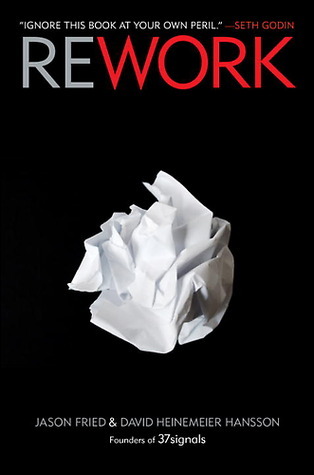More on this book
Community
Kindle Notes & Highlights
You have the most information when you’re doing something, not before you’ve done it. Yet when do you write a plan? Usually it’s before you’ve even begun.
Working without a plan may seem scary. But blindly following a plan that has no relationship with reality is even scarier.
Working more doesn’t mean you care more or get more done. It just means you work more.
It’s just that your efforts need to feel valuable.
Don’t sit around and wait for someone else to make the change you want to see.
If you’re going to do something, do something that matters.
If you’re solving someone else’s problem, you’re constantly stabbing in the dark.
“solve your own problem” approach lets you fall in love with what you’re making. You know the problem and the value of its solution intimately.
What you do is what matters,
Great businesses have a point of view, not just a product or service.
When you don’t know what you believe, everything becomes an argument. Everything is debatable. But when you stand for something, decisions are obvious.
Standing for something isn’t just about writing it down. It’s about believing it and living it.
Huge organizations can take years to pivot. They talk instead of act. They meet instead of do.
So before you sing the “not enough” blues, see how far you can get with what you have.
The stuff you have to do is where you should begin. Start at the epicenter.
You don’t have to live with a decision forever. If you make a mistake, you can correct it later.
So constantly look for things to remove, simplify, and streamline.
Improving the current menu didn’t come first. Trimming it down came first. Then he polished what was left.
When things aren’t working, the natural inclination is to throw more at the problem. More people, time, and money. All that ends up doing is making the problem bigger. The right way to go is the opposite direction: Cut back.
audience.
Think about it this way: If you had to launch your business in two weeks, what would you cut out? Funny how a question like that forces you to focus.
What could you be doing instead?
Also, don’t be timid about your conclusions. Sometimes abandoning what you’re working on is the right move, even if you’ve already put in a lot of effort.
Or make the first or last half of the day your alone-time period.
Your day is under siege by interruptions. It’s on you to fight back.
Always have a clear agenda.
End with a solution and make someone responsible for implementing it.
Momentum fuels motivation.
The longer something takes, the less likely it is that you’re going to finish it.
Keep in mind that the obvious solution might very well be quitting.
estimates that stretch weeks, months, and years into the future are fantasies. The truth is you just don’t know what’s going to happen that far in advance.
Long lists are guilt trips. The longer the list of unfinished items, the worse you feel about it. And at a certain point, you just stop looking at it because it makes you feel bad.
Once ego and pride are on the line, you can’t change your mind without looking bad. The desire to save face trumps the desire to make the right call.
If you think a competitor sucks, say so. When you do that, you’ll find that others who agree with you will rally to your side. Being the anti-______ is a great way to differentiate yourself and attract followers.
Defensive companies can’t think ahead; they can only think behind. They don’t lead; they follow.
Start getting into the habit of saying no—even to many of your best ideas. Use the power of no to get your priorities straight. You rarely regret saying no. But you often wind up regretting saying yes.
People are surprisingly understanding when you take the time to explain your point of view.
Scaring away new customers is worse than losing old customers.
By all means, have as many great ideas as you can. Get excited about them. Just don’t act in the heat of the moment. Write them down and park them for a few days. Then, evaluate their actual priority with a calm mind.
The requests that really matter are the ones you’ll hear over and over. After a while, you won’t be able to forget them. Your customers will be your memory. They’ll keep reminding you.
Teaching probably isn’t something your competitors are even thinking about.
A recipe is much easier to copy than a business.
Don’t worry about how you’re supposed to sound and how you’re supposed to act. Show the world what you’re really like, warts and all.
Keep things clean and unencumbered but don’t sterilize.
Trade the dream of overnight success for slow, measured growth.
You’ll be doing your company more harm than good if you bring in talented people who have nothing important to do.
Artificial work leads to artificial projects. And those artificial projects lead to real costs and complexity.
You need an environment where everyone feels safe enough to be honest when things get tough.
They don’t need heavy direction. They don’t need daily check-ins. They do what a manager would do—set the tone, assign items, determine what needs to get done, etc.—but they do it by themselves and for themselves.
Even the best apology won’t rescue you if you haven’t earned people’s trust.


